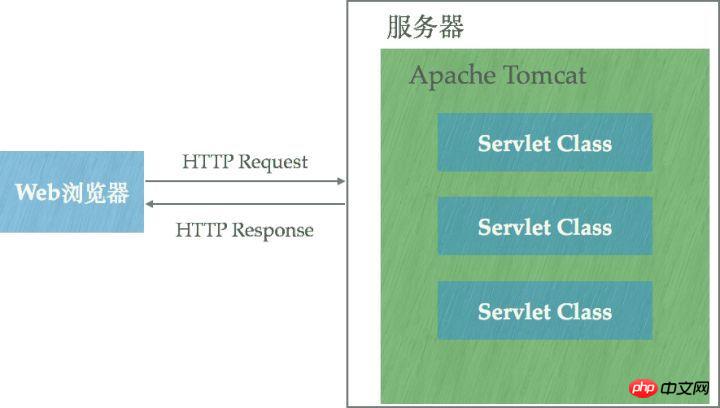
This article mainly introduces the difference between tomcat, nginx, and Apache HTTP Server Project. It has certain reference value. Now I share it with you. Friends in need can refer to it.
Apache refers to A project under the Apache Software Foundation - Apache HTTP Server Project; Nginx is also an open source HTTP server software (of course it can also be used as a mail proxy server and a general TCP proxy server).
HTTP server is essentially an application - it usually runs on the server, binds the IP address of the server and listens to a certain tcp port to receive and process HTTP requests, so that the client (generally IE , Firefox, Chrome) can obtain web pages (HTML format), documents (PDF format), audio (MP4 format), video (MOV format) and other resources on the server through the HTTP protocol.
The following figure describes this process:
 Not only Apache HTTP Server and Nginx, but also simple HTTP server convenience is implemented in the class libraries included in most programming languages. Developers use: HttpServer (Java HTTP Server) Python SimpleHTTPServer can run an HTTP server very easily using these libraries. They can all provide HTTP services by binding IP addresses and listening on tcp ports.
Not only Apache HTTP Server and Nginx, but also simple HTTP server convenience is implemented in the class libraries included in most programming languages. Developers use: HttpServer (Java HTTP Server) Python SimpleHTTPServer can run an HTTP server very easily using these libraries. They can all provide HTTP services by binding IP addresses and listening on tcp ports.
Apache Tomcat is another project under the Apache Foundation. Compared with Apache HTTP Server, Tomcat can dynamically generate resources and return them to the client. Both Apache HTTP Server and Nginx can return the content of a certain text file to the client through the HTTP protocol, but the content of this text file is fixed - that is to say, no matter when and whoever accesses it, the content obtained is completely Similarly, we call such resources static resources.
Dynamic resources are on the contrary. The content obtained when accessed by different clients at different times is different. For example: a page containing the current time and a page displaying the current IP address. Apache HTTP Server and Nginx themselves do not support generation. Dynamic pages, but they can be supported through other modules (such as through Shell, PHP, Python scripts to dynamically generate content). If you want to use Java programs to dynamically generate resource content, it is difficult to do so using this type of HTTP server. Java Servlet technology and the derived Java Server Pages technology allow Java programs to also have the ability to process HTTP requests and return content (dynamically controlled by the program). Tomcat is the container (Container) that supports running Servlet/JSP applications:

Tomcat runs on the JVM. Like the HTTP server, it binds an IP address and listens to the TCP port. It also contains the following accusations:
Manage the life cycle of the Servlet program
Map the URL to the specified Servlet for processing
Work with the Servlet program to process HTTP requests—— Generate an HttpServletResponse object based on the HTTP request and pass it to the Servlet for processing, and return the content generated by the HttpServletResponse object in the Servlet to the browser
Although Tomcat can also be considered an HTTP server, usually it It will still be used with Nginx: separation of dynamic and static resources - use Nginx's reverse proxy function to distribute requests: all dynamic resource requests are handed over to Tomcat, while static resource requests (such as pictures, videos, CSS, JavaScript files, etc.) ) is directly returned to the browser by Nginx, which can greatly reduce the pressure on Tomcat. Load balancing. When business pressure increases, one Tomcat instance may not be enough to handle it. At this time, multiple Tomcat instances can be started for horizontal expansion, and Nginx's load balancing function can distribute requests to different instances through algorithms. deal with.
The above is the entire content of this article. I hope it will be helpful to everyone's study. For more related content, please pay attention to the PHP Chinese website!
Related recommendations:
nginx About the difference between root and alias
##Infinite classification and infinite nesting comments in PHP
The above is the detailed content of The difference between tomcat and nginx, Apache HTTP Server Project. For more information, please follow other related articles on the PHP Chinese website!




